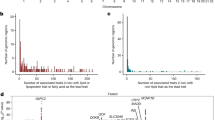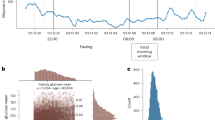Abstract
Background:
Adiponectin is an abundantly expressed adipocyte-specific protein, whose level is decreased in obesity, and which appears to be a key participant in developing inflammation, insulin resistance and metabolic syndrome (MetS). We examined whether the relationship between adiponectin and inflammatory markers, insulin resistance and MetS was independent of obesity.
Methods and results:
The study was performed in 1094 men and women, aged 27–77 years, from a representative community population. We measured serum inflammatory markers, homoeostasis model assessment of insulin resistance (HOMA-IR) and prevalent MetS using National Cholesterol Education Program ATPIII criteria. Sex- and age-adjusted plasma adiponectin concentration was inversely correlated with body mass index (BMI), waist–hip ratio, diastolic blood pressure, triglycerides, glucose and fasting insulin, and positively correlated with HDL cholesterol (all P<0.005). Log plasma adiponectin was a significant negative correlate of the levels of C-reactive protein, interleukin-6, interleukin-18, fibrinogen and white cell count independent of level of obesity. Log plasma adiponectin was also an inverse associate of log HOMA-IR (P<0.001) independent of obesity. Subjects in the top compared to bottom sex-specific plasma adiponectin quartile had a multivariate-adjusted odds ratio (OR) of 0.21 (95% CI, 0.11–0.42; P<0.001) for prevalent MetS, and the association was independent of age, sex, BMI, log insulin and log intereukin-18 levels.
Conclusion:
Our findings suggest that higher circulating adiponectin levels may mitigate against adipose-related inflammation, insulin resistance and MetS as much in lean as obese persons. At any rate circulating adiponectin level is a strong risk marker for MetS, which is independent of measures of adiposity, insulin resistance and inflammatory markers.
This is a preview of subscription content, access via your institution
Access options
Subscribe to this journal
Receive 12 print issues and online access
$259.00 per year
only $21.58 per issue
Buy this article
- Purchase on Springer Link
- Instant access to full article PDF
Prices may be subject to local taxes which are calculated during checkout



Similar content being viewed by others
References
National Cholesterol Education Program (NCEP). Third report of the National Cholesterol Education Program (NCEP) expert panel on detection, evaluation, and treatment of high blood cholesterol in adults (Adult Treatment Panel III) final report. Circulation 2002; 106: 3143–3421.
Caterson ID, Hubbard V, Bray GA, Grunstein R, Hansen BC, Hong Y et al. Prevention conference VII: obesity, a worldwide epidemic related to heart disease and stroke: group III: worldwide comorbidities of obesity. Circulation 2004; 110: e476–e483.
Berg AH, Scherer PE . Adipose tissue, inflammation, and cardiovascular disease. Circ Res 2005; 96: 939–949.
Matsuzawa Y . Adiponectin: identification, physiology and clinical relevance in metabolic and vascular disease. Atherosclerosis Supplements 2005; 6: 7–14.
Scherer PE, Williams S, Fogliano M, Baldini G, Lodish HF . A novel serum protein similar to c1q, produced exclusively in adipocytes. J Biol Chem 1995; 270: 26746–26749.
Hu E, Liang P, Spiegelman BM . AdipoQ is a novel adipose-specific gene dysregulated in obesity. J Biol Chem 1996; 271: 10697–10703.
Arita Y, Kihara S, Ouchi N, Takahashi M, Maeda K, Miyagawa J et al. Paradoxical decrease of an adipose-specific protein, adiponectin, in obesity. Biochem Biophys Res Commun 1999; 257: 79–83.
Yamauchi T, Kamon J, Minokoshi Y, Ito Y, Waki H, Uchida S et al. Adiponectin stimulates glucose utilization and fatty-acid oxidation by activating amp-activated protein kinase. Nat Med 2002; 8: 1288–1295.
Berg AH, Combs TP, Du X, Brownlee M, Scherer PE . The adipocyte-secreted protein acrp30 enhances hepatic insulin action. Nat Med 2001; 7: 947–953.
Yamauchi T, Kamon J, Waki H, Terauchi Y, Kubota N, Hara K et al. The fat-derived hormone adiponectin reverses insulin resistance associated with both lipoatrophy and obesity. Nat Med 2001; 7: 941–946.
Yamamoto Y, Hirose H, Saito I, Tomita M, Taniyama M, Matsubara K et al. Correlation of the adipocyte-derived protein adiponectin with insulin resistance index and serum high-density lipoprotein-cholesterol, independent of body mass index, in the Japanese population. Clin Sci 2002; 103: 137–142.
Tschritter O, Fritsche A, Thamer C, Haap M, Shirkavand F, Rahe S et al. Plasma adiponectin concentrations predict insulin sensitivity of both glucose and lipid metabolism. Diabetes 2003; 52: 239–243.
Nilsson PM, Engstrom G, Hedblad B, Frystyk J, Persson MM, Berglund G et al. Plasma adiponectin levels in relation to carotid intima media thickness and markers of insulin resistance. Arterioscler Thromb Vasc Biol 2006; 26: 2758–2762.
Spranger J, Kroke A, Mohlig M, Bergmann MM, Ristow M, Boeing H et al. Adiponectin and protection against type 2 diabetes mellitus. Lancet 2003; 361: 226–228.
Duncan BB, Schmidt MI, Pankow JS, Bang H, Couper D, Ballantyne CM et al. Adiponectin and the development of type 2 diabetes: the atherosclerosis risk in communities study. Diabetes 2004; 53: 2473–2478.
Ouchi N, Kihara S, Arita Y, Maeda K, Kuriyama H, Okamoto Y et al. Novel modulator for endothelial adhesion molecules: adipocyte-derived plasma protein adiponectin. Circulation 1999; 100: 2473–2476.
Ouchi N, Kihara S, Arita Y, Okamoto Y, Maeda K, Kuriyama H et al. Adiponectin, an adipocyte-derived plasma protein, inhibits endothelial NF-{kappa}B signaling through a cAMP-dependent pathway. Circulation 2000; 102: 1296–1301.
Yokota T, Oritani K, Takahashi I, Ishikawa J, Matsuyama A, Ouchi N et al. Adiponectin, a new member of the family of soluble defense collagens, negatively regulates the growth of myelomonocytic progenitors and the functions of macrophages. Blood 2000; 96: 1723–1732.
Dietze-Schroeder D, Sell H, Uhlig M, Koenen M, Eckel J . Autocrine action of adiponectin on human fat cells prevents the release of insulin resistance-inducing factors. Diabetes 2005; 54: 2003–2011.
Kadowaki T, Yamauchi T, Kubota N, Hara K, Ueki K, Tobe K . Adiponectin and adiponectin receptors in insulin resistance, diabetes, and the metabolic syndrome. J Clin Invest 2006; 116: 1784–1792.
Choi KM, Lee J, Lee KW, Seo JA, Oh JH, Kim SG et al. Serum adiponectin concentrations predict the developments of type 2 diabetes and the metabolic syndrome in elderly Koreans. Clin Endocrinol 2004; 61: 75–80.
Mohan V, Deepa R, Pradeepa R, Vimaleswaran KS, Mohan A, Velmurugan K et al. Association of low adiponectin levels with the metabolic syndrome—the Chennai Urban Rural Epidemiology Study (CURES-4). Metabolism 2005; 54: 476–481.
Matsushita K, Yatsuya H, Tamakoshi K, Wada K, Otsuka R, Takefuji S et al. Comparison of circulating adiponectin and proinflammatory markers regarding their association with metabolic syndrome in Japanese men. Arterioscler Thromb Vasc Biol 2006; 26: 871–876.
Wannamethee SG, Tchernova J, Whincup P, Lowe GD, Rumley A, Brown K et al. Associations of adiponectin with metabolic and vascular risk parameters in the British regional heart study reveal stronger links to insulin resistance-related than to coronory heart disease risk-related parameters. Int J Obes 2007; 31: 1089–1097.
Hung J, McQuillan BM, Chapman CML, Thompson PL, Beilby JP . Elevated interleukin-18 levels are associated with the metabolic syndrome independent of obesity and insulin resistance. Arterioscler Thromb Vasc Biol 2005; 25: 1268–1273.
McQuillan BM, Beilby JP, Nidorf M, Thompson PL, Hung J . Hyperhomocysteinemia but not the C677T mutation of methylenetetrahydrofolate reductase is an independent risk determinant of carotid wall thickening. The Perth Carotid Ultrasound Disease Assessment Study (CUDAS). Circulation 1999; 99: 2383–2388.
Chapman CML, Beilby JP, McQuillan BM, Thompson PL, Hung J . Monocyte count, but not C-reactive protein or interleukin-6, is an independent risk marker for subclinical carotid atherosclerosis. Stroke 2004; 35: 1619–1624.
Alberti KGM, Zimmet P, Shaw J . The metabolic syndrome—a new worldwide definition. Lancet 2005; 366: 1059–1062.
Matthews DR, Hosker JP, Rudenski AS, Naylor BA, Treacher DF, Turner RC . Homeostasis model assessment: insulin resistance and beta-cell function from fasting insulin and glucose concentrations in man. Diabetologia 1985; 28: 412–419.
Lihn AS, Bruun JM, He G, Pedersen SB, Jensen PF, Richelsen B . Lower expression of adiponectin mRNA in visceral adipose tissue in lean and obese subjects. Mol Cell Endocrinol 2004; 219: 9–15.
Cnop M, Havel PJ, Utzschneider KM, Carr DB, Sinha MK, Boyko EJ et al. Relationship of adiponectin to body fat distribution, insulin sensitivity and plasma lipoproteins: Evidence for independent roles of age and sex. Diabetologia 2003; 46: 459–469.
Nishizawa H, Shimomura I, Kishida K, Maeda N, Kuriyama H, Nagaretani H et al. Androgens decrease plasma adiponectin, an insulin-sensitizing adipocyte-derived protein. Diabetes 2002; 51: 2734–2741.
Ouchi N, Kihara S, Funahashi T, Nakamura T, Nishida M, Kumada M et al. Reciprocal association of c-reactive protein with adiponectin in blood stream and adipose tissue. Circulation 2003; 107: 671–674.
Schulze MB, Rimm EB, Shai I, Rifai N, Hu FB . Relationship between adiponectin and glycemic control, blood lipids, and inflammatory markers in men with type 2 diabetes. Diabetes Care 2004; 27: 1680–1687.
Rothenbacher D, Brenner H, Marz W, Koenig W . Adiponectin, risk of coronary heart disease and correlations with cardiovascular risk markers. Eur Heart J 2005; 26: 1640–1646.
Herder C, Hauner H, Haastert B, Rohrig K, Koenig W, Kolb H et al. Hypoadiponectinemia and proinflammatory state: two sides of the same coin?: results from the cooperative health research in the region of Augsburg Survey 4 (KORA S4). Diabetes Care 2006; 29: 1626–1631.
Abbasi F, Chu JW, Lamendola C, McLaughlin T, Hayden J, Reaven GM et al. Discrimination between obesity and insulin resistance in the relationship with adiponectin. Diabetes 2004; 53: 585–590.
Wannamethee SG, Whincup PH, Lennon L, Sattar N . Circulating adiponectin levels and mortality in elderly men with and without cardiovascular disease and heart failure. Arch Intern Med 2007; 167: 1510–1517.
Acknowledgements
This study was supported in part by a grant-in-aid from the National Health and Medical Research Council (211980) and HeartSearch, Perth, Western Australia (JB).
Author information
Authors and Affiliations
Corresponding author
Additional information
Disclosure/Conflict of interest
None.
Rights and permissions
About this article
Cite this article
Hung, J., McQuillan, B., Thompson, P. et al. Circulating adiponectin levels associate with inflammatory markers, insulin resistance and metabolic syndrome independent of obesity. Int J Obes 32, 772–779 (2008). https://doi.org/10.1038/sj.ijo.0803793
Received:
Revised:
Accepted:
Published:
Issue Date:
DOI: https://doi.org/10.1038/sj.ijo.0803793
Keywords
This article is cited by
-
Clinical and biological risk factors associated with inflammation in patients with type 2 diabetes mellitus
BMC Endocrine Disorders (2022)
-
PPAR-γ Gene Expression in Human Adipose Tissue Is Associated with Weight Loss After Sleeve Gastrectomy
Journal of Gastrointestinal Surgery (2022)
-
How the love of muscle can break a heart: Impact of anabolic androgenic steroids on skeletal muscle hypertrophy, metabolic and cardiovascular health
Reviews in Endocrine and Metabolic Disorders (2021)
-
The relationship between dietary patterns and grip strength in the general population: the TCLSIH cohort study
European Journal of Nutrition (2021)
-
Potential impact of the joint association of total bilirubin and gamma-glutamyltransferase with metabolic syndrome
Diabetology & Metabolic Syndrome (2019)



